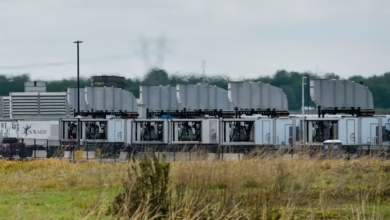Al Gore: China’s Climate Progress ‘Surpassed All Expectations’

▼ Summary
– Al Gore reflects on the irony that China, not the U.S., has become the global leader in renewable energy transition, a scenario he would not have predicted 25 years ago.
– Gore expresses frustration that the U.S. has ceded climate leadership but emphasizes that progress is more important than which country leads it.
– China’s rapid expansion in solar energy and shift from carbon intensity to absolute emissions reductions are highlighted as key factors in its dominance.
– The report discusses challenges like AI-driven energy demand and irresponsible mining but notes that renewables and technology can mitigate environmental impacts.
– Despite policy setbacks, Gore remains optimistic due to accelerating adoption of clean energy and declining costs, though urgency is needed to avoid climate tipping points.
A quarter century after his presidential bid, Al Gore reflects on a global energy transformation few could have predicted. China’s emergence as a dominant force in renewable energy has fundamentally reshaped the climate leadership landscape, surpassing even the most optimistic projections. While the United States grapples with policy inconsistency, international momentum toward sustainability continues to build, driven by technological advances and growing investment in clean energy infrastructure.
Gore acknowledges that the current reality would have seemed improbable decades ago. Rather than expressing disappointment over shifting global roles, he emphasizes the importance of progress regardless of its origin. The critical concern lies in missed opportunities, the potential for accelerated innovation had the U.S. maintained consistent environmental leadership.
In a recent discussion tied to the release of a comprehensive climate report, Gore and Lila Preston of Generation Investment Management highlighted several pressing issues. Their conversation touched on rare earth mineral demand, the energy implications of artificial intelligence expansion, and the environmental impact of space exploration.
When questioned about reliance on U.S. climate leadership given its fluctuating policies, Gore pointed to encouraging global trends. Financing for renewables now substantially outpaces fossil fuel investments, reflecting a decisive shift in energy priorities. He noted that despite American political volatility, worldwide progress remains robust.
The report introduces the concept of an “electro state,” a designation applied to China due to its extraordinary advances in solar energy deployment. The country has not only met ambitious targets years ahead of schedule but has also shifted its accountability framework from carbon intensity to absolute reductions, a move signaling confidence in its environmental trajectory.
The elimination of emissions reporting requirements for coal plants and refineries raises alarms about transparency and accountability. Gore criticized attempts to obscure environmental data but highlighted alternative monitoring efforts like Climate TRACE, which tracks greenhouse gas emissions in real time across millions of global sites.
Rising energy demand from data centers, particularly those supporting AI development, presents both challenges and opportunities. While electricity consumption is projected to double by 2030, innovations in renewable storage and geothermal energy offer pathways to meet this demand sustainably. AI itself may also contribute to emissions reduction through efficiency gains in sectors like agriculture and transportation.
However, not all tech-sector practices align with climate objectives. Reports of unpermitted gas turbines operating in environmentally vulnerable communities underscore ongoing issues of environmental justice. Gore condemned such practices, emphasizing that marginalized populations should not bear disproportionate health risks from industrial emissions.
The extraction of precious minerals necessary for technology manufacturing remains a complex issue. While responsible mining is achievable, it requires stringent oversight to prevent ecological and social harm. Fortunately, technological tools including AI-assisted prospecting are reducing the environmental footprint of resource extraction.
The growing space industry also faces scrutiny over rocket launch emissions. Gore maintains that the benefits of Earth observation from orbit outweigh the environmental costs of launches, though continuous assessment remains necessary.
Looking forward, reasons for optimism abound. Renewable technologies are becoming more affordable and widespread, and public support for climate action is stronger than ever. Yet the urgency of the situation is underscored by alarming environmental signals, such as the disruption of critical ocean currents.
As Gore aptly notes, change often unfolds slower than anticipated before accelerating rapidly. The tools for a sustainable future exist; the task now is to implement them swiftly and equitably.
(Source: TechCrunch)


